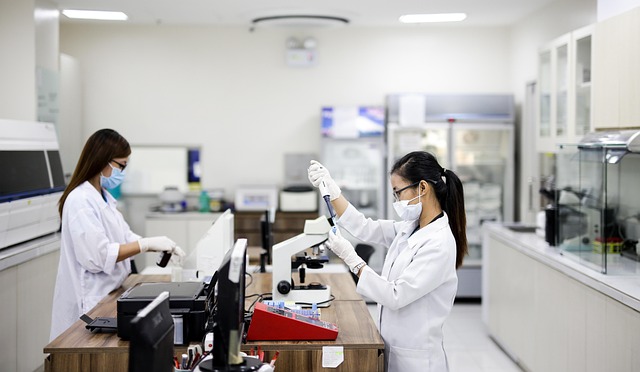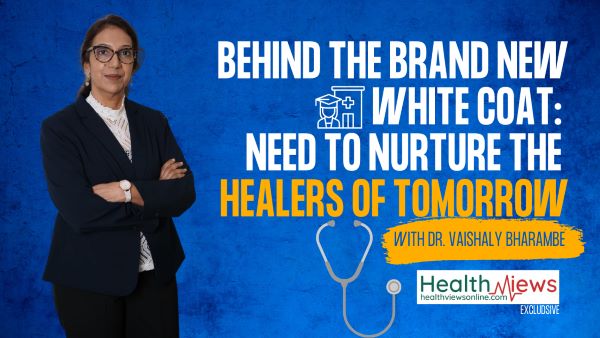This article ‘Behind the Brand New White Coat: Need to Nurture the Healers of Tomorrow’ is written by Dr Vaishaly Bharambe, MBBS, MD, PhD-Anatomy. Counsellor and Medical Educator. Founder: VB Anatomy Academy (YouTube channel)
The Dream and the Struggle of Medical Students
Medicine is a dream for many students. It is a program for which countless aspirants work tirelessly. They imagine themselves as healers, performing life-saving surgeries, conducting pathbreaking treatments, and carrying the weight of human lives in their hands. Getting into medical school itself is an uphill challenge. It involves long hours of study, meticulous preparation, and repeated practice until finally one secures the score that meets the stringent criteria for admission.
With this achievement comes immense joy—a sense of pride and respect in the eyes of parents, family members, and friends. For the student, it lights a small candle of hope in the heart, a feeling that says:
“The dream I have nurtured is achievable. I am finally taking my first steps towards a life I had only imagined.”
Yet, very soon, the realization dawns that securing admission is not the end but merely the beginning of a long and demanding journey. The path ahead is challenging, and the destination is still distant.

The First Encounter with Anatomy and the Cadaver
The journey begins with entry into the first year of medical school, especially with the foundational subject of Anatomy. Here, the medical student faces one of the most profound and unsettling experiences—the first meeting with the cadaver.
As a teacher who has been in medical education for more than 25 years, I have seen that students often look forward to this moment with a mix of excitement and nervous anticipation. Colleges prepare them through orientation sessions, explaining that the cadaver is their first teacher, a result of the noble act of body donation. They are taught how to handle instruments, wear gloves, and treat the cadaver with respect and dignity.
Yet, no amount of preparation can fully anticipate the emotional reality of the encounter. Along with the cadaver comes the sharp, penetrating smell of formalin, which irritates the eyes, causes watering, and even nausea in some. For many students, this is their very first experience of being in close proximity to a dead body.
At the tender age of 18, most have rarely, if ever, seen an unclothed adult body in entirety—let alone one that is lifeless. The first encounter is therefore not just academic but deeply emotional. For many, it is their first brush with the reality of death. Having lived, by God’s grace, without losing a loved one, some students realize with a jolt that this cadaver was once a living, breathing human being. Now, though lifeless, it remains present in a form that they are expected to dissect and learn from.
This duality—of reverence and unease—creates a complex emotional response. Some students find the experience humbling, while others find it unsettling, even traumatic. It is not uncommon for them to experience heightened anxiety in the days surrounding this event. Some return to their rooms with unspoken fears, facing nightmares, unexplained tremors, bouts of sweating, or a persistent unease.
Also Read: Breaking the Silence on Mental Health Crisis in Medical Colleges
The Silent Guilt of Struggling Medical Students: The Healers of Tomorrow
The difficulty is compounded by the fact that students often feel they have no right to react this way. Having entered medical school after years of determination and sacrifice, they feel guilty acknowledging fear, discomfort, or disinterest. A thought lingers:
“This was my dream—why does the cadaver scare me? Why do I not feel inspired? Why must I go through this to become a doctor?”
This inner conflict, kept hidden, can magnify distress. Many students suffer in silence because they believe their struggles undermine their worthiness to be in medicine.
Beyond the Dissection Hall: Other Sources of Stress
At the same time, other struggles are unfolding in parallel. Some students take longer to make friends, and in the absence of a support system, the cadaver encounter becomes even more morbid and isolating. Hostel life itself brings its own challenges—sharing a room with two or three others, losing privacy, managing chores independently after a childhood where everything was taken care of by parents, adjusting to hostel food that is often unpalatable, and adapting to a curriculum that has suddenly quadrupled in volume and speed.

For many, the pace of lectures and dissections feels unmanageable. They fall behind and begin to doubt themselves. The combination of academic burden, homesickness, loss of familiar comforts, and the stark reality of human death creates a cocktail of stress that overwhelms even the brightest minds.
I have personally had students come to me and simply break down in tears. At such moments, I have had to just listen—allowing them to release their grief—before beginning the process of healing.
Why Counsellors Matter to Medical Students
The healing, ultimately, happens within the student, but the bridge that takes them across to that healing state is often the counsellor. It is therefore essential that counselling services are made accessible to medical students at this fragile stage.
A counsellor provides a safe, confidential space where students can express their fears and insecurities without judgment. The very act of being heard can lift a burden. Moreover, counsellors can help students develop coping strategies for stress, anxiety, and homesickness, allowing them to regain balance and continue their medical journey with renewed strength.
Importantly, counsellors should be available at flexible hours, creating a sense of security that students can reach out whenever needed. Confidentiality must be guaranteed, so that the student feels safe in sharing vulnerabilities.
Also Read: Augmented Reality for Medical Training: A New Approach to Educating Future Doctors
The Role of Parents and Teachers
Parallelly, the role of parents cannot be underlined enough. This is not the time to pressurize children to perform; rather, it is the time to quietly support them as they acclimatize to an entirely new environment. Parents remain the emotional anchors for their children—even if separated by hundreds or thousands of miles. If those anchors begin to exert additional pressure, the child is left rudderless, unsure of where to turn for comfort or stability.
Teachers too have a vital role. For a student struggling to cope, a kind word or an empathetic ear from a faculty member can be transformative. Teachers should look beyond grades and recognize the human being behind the roll number.
Comparisons and Isolation
There is, of course, always that one student who seems to “ace” everything—adjusting to hostel life easily, coping with the cadaver confidently, and excelling academically right from the start. Their existence, ironically, becomes a burden for others. Struggling students begin to compare themselves unfavorably, further isolating themselves and sinking deeper into self-doubt.
This highlights the importance of fostering a culture of empathy within medical schools, where students are reminded that everyone adjusts at a different pace, and that struggling is not a sign of weakness but a part of growth.
Building Empathy in Future Doctors
This is precisely why counselling is not a luxury but a necessity. We must be there for these young medical students—the future doctors of our nation. They need time to emotionally acclimatize to their new environment before we demand excellence from them in academics. It is incorrect and unfair to expect them to behave like machines. Each student is a human being with an individual way of reacting to the stress of the first year of medical school.
If we, as teachers, parents, and counsellors, do not provide the necessary support—if we expect them to perform like programmed machines—then we do a great disservice to the next generation of doctors. And in the end, it will reflect in the kind of doctors we create.

If we fail to show empathy to our students today, how can we expect them to grow into empathetic doctors tomorrow?




